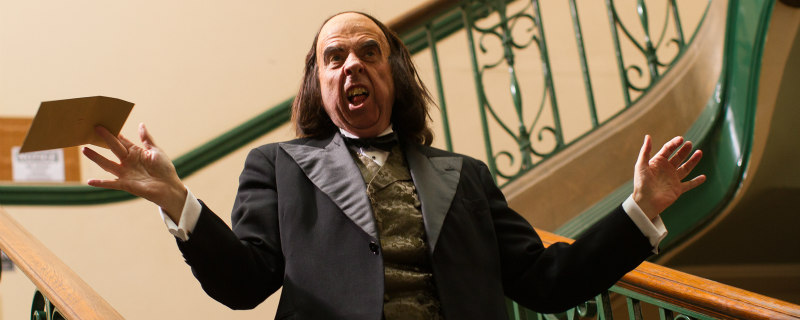
Review by Ren Zelen
Directed by: Stephen Cookson
Starring: Timothy Spall

Stanley, a Man of Variety, a film co-written by Stephen Cookson (My Angel), is a one-hander starring the much-beloved veteran actor Timothy Spall, who plays an array of characters.
Initially, Stanley, a Man of Variety is a rather surreal, Kafkaesque production, held together by the loosest of storylines. Stanley is a mental patient, wasting away in a gloomy, secure psychiatric facility, after apparently having been found guilty of a terrible crime.
Stanley is seen alone in the institution, but he routinely mops and cleans the grim corridors and staircases in order to receive reward tokens, which can be used to power a television in his tiny cell.

On this TV screen he watches old black and white VCR cassettes featuring vintage comic characters from the days of British vaudeville and early cinema. These characters then intrude into his consciousness in visions, tormenting him with questions and participating in disjointed fantasies about his past.
Spall plays all the characters - doctors, judges, his own parents - and he also channels erstwhile comedic luminaries such as Tony Hancock, Noël Coward, Max Wall, Alistair Sim, Margaret Rutherford and others.
Stanley pleads with all to let him out, as he is desperate to visit his daughter’s grave - a daughter who died 15 years previously. Their refusal leads him to what might be an attempted suicide, but later he is seen to be leaving the institution with a large suitcase.
In its latter stages the action (if one can call this odd collection of vignettes that) transfers to a flat where Stanley is now living and seemingly coping with day to day tasks. He is seen on the phone, reassuring the doctor of his stability and confirming that he is meticulous in taking his medication.
However, the film continues to be punctuated by odd sound effects and faint snatches of voices or music which indicate that he is still being plagued by hallucinations that we cannot now see. He has mundane one-sided conversations with invisible persons and it’s questionable as to whether he has actually been taking his prescribed medication.

His language, which has been precise, pedantic, and erudite throughout, begins less to resemble the prosaic, voluble discourse of Alan Bennett and becomes more like the troubling monologues of Pinter or Beckett.
This is undoubtedly a tour-de-force performance from Spall, but the film itself is problematic - it’s a conundrum as what kind of audience it is hoping to attract. It is not a film the general public would flock to see - it is far too odd and obscure - but it may be one for the dedicated cinephile, the drama student or those with an academic interest in film.
It is one of those eccentric pieces of theatre which are opaque and surreal, yet oddly compelling. It’s always been an intriguing spectacle to watch an actor perform multiple roles, and the assurance of Spall’s performance is admirable. However, the multi-character gimmick here rests on his impressions of comic characters few people under the age of 60 would even recognise. The surrealism of the film (weird and wonderful imagery by Ismael Issa) is what keeps the viewer’s attention rather than the scenes which feature Spall as some now-obscure, former British comedian.
The main stumbling block of the film is a lack of coherence, as the script is mostly a collection of sketches. The vague storyline, co-written (and partly improvised one imagines) by Spall with director Cookson, is merely a loose framework: Stanley’s crime is never made entirely clear - did he kill his brother, or his daughter’s boyfriend, or who exactly? Does it even matter?

Much of Stanley’s enactments feel like nostalgic conversations with classic comedians. They serve the plot, but don’t succeed in transferring any of the enthusiasm felt for this era by the protagonist. This aspect of the film comes across rather like an in-joke between the writers, but a younger viewer is likely to feel excluded.
As an examination of mental health however, Stanley, a Man of Variety fares rather better, and conveys the disjointed perception and personality of someone who has almost completely lost touch with reality and to whom fantasy has become the usual mode of existence. The last few minutes of the film are particularly revelatory in this regard and will leave us also wondering just how much of what we have been watching was in any way real.

Stanley, a Man of Variety is in UK cinemas now.

